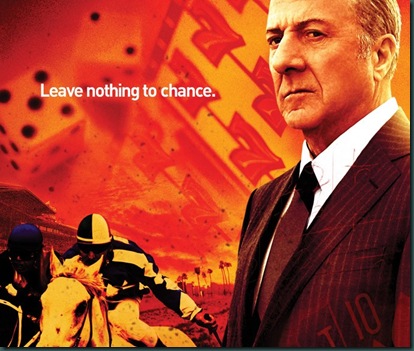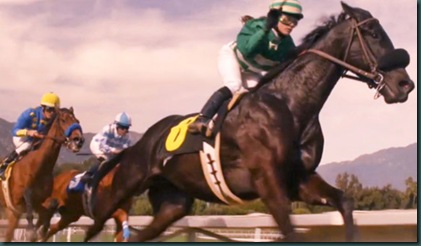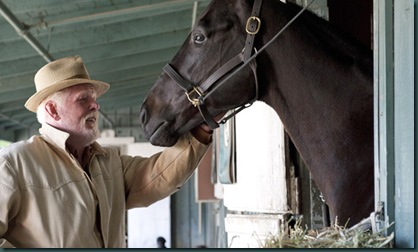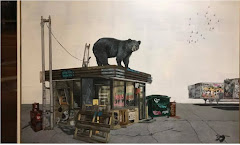Nobody’s perfect.
Least of all in television, where even approaching perfection is not enough to ensure success.
Exceptional television series are cancelled every season while those that insult intelligence, squander talent and revel in mediocrity live long and prosper. That’s just the way of our world.
It’s sad when we lose a good one, especially one that was as creatively drawn and professionally executed as HBO’s “Luck”.
“Luck” was cancelled last month following the deaths of three horses over the twelve episodes that had been put into production. Unfortunate circumstances to be sure. But not of the kind that should color our appreciation of what was accomplished.
Prior to the stable doors being closed for good, there had been an option to continue without racing and horse centric scenes. The series producers opted to make a clean break instead and shut it all down.
But it would be wrong to start a campaign to change the minds of those who put the series out to pasture. And it would be equally wrong to seek a way to revive it in a modified form.
That’s because “Luck” was a shining example of how impactful television can be, an impact that would have been rendered inconsequential by diluting its essence.
For at its heart the series was an essential exploration of the attempts we all make to find our own versions of perfection, of redemption, of healing what has been broken in us.
But if it could no longer be what it was conceived to be. If it could not provide all that it was meant to provide. Then it was right that it step aside to make way for another series that might find a way to reveal similar truths.
“Luck” was set in an arena foreign to most who watch television. It was populated with characters largely unfamiliar in our daily lives, horsemen and inveterate gamblers, corporate and organized criminals. And above all else, it was about horses and their ability to ignite something special in the human heart.
As integral as it has been to our history and culture, as loved and admired as the animal remains, the horse is a dying and disappearing breed.
We simply no longer have the need of them that we once had. Each year thousands who can no longer earn their keep are trucked to slaughterhouses, or worse, abandoned into the wild to starve.
Barely a century ago, great cities like London and New York were home to hundreds of thousands of horses who hauled everything from produce to buses and taxis.
They not only inhabited every farm in the country but were stabled in most private homes. They carried children to school, armies into battle and our heroes across the silver screen.
They were a primary source of recreation and entertainment, serving not only with their physical gifts but as companions acknowledged for the restorative skills of their gentle nature.
To some, the decline of the horse is a perfect metaphor for what is happening to the rest of our society.
For example, there are now six million fewer jobs available in America than there were scant years ago. Careers, even lifestyles which, no matter what any politician tells you, aren’t coming back.
Many of us have simply been rendered redundant, the needs of an ever growing population now serviced by technological advancement or other efficiencies.
But like the horse, the displaced are still here. And likewise, they have lost a sense of purpose, options for self-realization and perhaps even the ability to hope.
More and more one’s outcomes seem to rely on luck.
It was therefore fitting that series creators David Milch and Michael Mann used the last remaining recognizable domain of the horse as an entree into exploring those realities along with other elements our culture seems to be discarding.
Personal morality, ethical relationships, values once widely espoused and the boundaries of basic decency to other human beings and “dumb” animals were at the core of "Luck” and its story lines.
But most important was the horse.
Several times during the first season, there was a moment when what the horse is and was literally overtook everything else happening in the complex, multi-level plot, almost stopping time to allow its appreciation.
Gambling addicts, suicidal agents, mob hitmen, jaded executives and others would suddenly become equally entranced watching a horse do no more than what a horse does –- run.
Everything those people wanted, needed at that moment or most desired in life was suddenly made physically possible right before their eyes.
It was as if the famous line uttered by Olympic runner Eric Liddell in “Chariots of Fire” were being made flesh:
“God made me for a purpose, but he also made me fast. And when I run I feel His pleasure.”
The pleasure that comes from realizing perfection, or dreams, or maybe just the original intention we had for our lives.
The horses of “Luck” gave hope to the hopeless, salved the wounds of past betrayal and promised that all we’ve been told is impossible is far from beyond our achieving.
In the wake of the demise of “Luck” many stepped forward to provide an autopsy on what killed it. But none touched the real reason it had to be euthanized.
Some pointed toward ratings, although the series was actually doing far better than shows HBO had renewed in the past. In fact, according to some, it held the promise of turning into a major revenue stream for the network.
Others claimed the deaths of horses on set had drawn the wrath of PETA, insurance companies, or was a PR problem that HBO executives couldn’t afford to have.
But the reality of the production was that “Luck” not only met or exceeded all guidelines the American Humane Society sets out for working with animals on a film set, it employed professional jockeys, trainers and wranglers already working for the Santa Anita racetrack, literally the last people who would have allowed horses to be mistreated or abused.
Whoever insured the series would have taken the inherent risks of thoroughbred racing into consideration as well. And they are not insignificant.
Last year more than 200 horses and 3 jockeys died on American tracks despite everything that is done to make them as safe as possible. More horses were lost on the opening day of the English racing season this year than succumbed on “Luck”.
Yet the negative publicity regarding those events was non-existent when compared with what was focused on “Luck”.
Given the planning that goes into any action sequence shot for film or television, it’s clear no one anticipated that serious equine casualties would result from the controlled shooting environment in which the racing sequences of “Luck” took place.
But they did and that meant that the showrunners had no choice but to abandon the series. When your creative theme is the inherent value of the horse to human beings you can’t undermine it by continuing to put them at risk.
If that seems like a stretch to you, trust me it’s not.
I’ve written or produced hundreds of episodes of network action series that required hundreds of stunts. I’ve been on sets where stunt performers have been injured, thankfully none seriously. Rest assured that the Monday morning quarterbacking and soul searching which follows is of a sort you don’t want to revisit.
If anyone had died, I know I would no longer be plying this trade.
And so, “Luck” must be sent on its way with sadness but great professional respect.
If you missed it, do yourself the favor of downloading it from iTunes. Unfortunately, there is no word yet on whether it will be released on DVD or an OTT service.
The performances of Dustin Hoffman and Nick Nolte are masterful, supported by Dennis Farina’s understated streetwise elegance, the controlled subtlety of John Ortiz and Jill Hennessey and perhaps best of all, the magical chemistry of the boys of the Foray stables.
No matter how often you were assured the characters played by Kevin Dunn, Ian Hart, Ritchie Coster and Jason Gedrick would die broke, you wished them a better fate.
There are also beautifully shot racing sequences and superb writing and direction that consistently underscore our forgotten or disappearing values.
But mostly there are the horses and the knowledge that if “Luck” had to be sacrificed for them, it was by far the better choice.








2 comments:
Lovely Jim. You've made me appreciate more! Thank you.
I also thought Kevin Dunn and Ritchie Coster were standouts. I wish them both material like that forever!
The show will be missed.
I worked out at Fort Polk in Louisiana when the US was mobilizing for their first entry into Iraq - a massive base where every Army tool was put to use, including mock Iraqi villages - and apart from the awesomeness of attack helicopters hovering in the sky and convoys of a hundred Hummers and tanks, was a pack of wild horses that seemed to always skirt the edges of the surrounding bush.
Magical.
Post a Comment